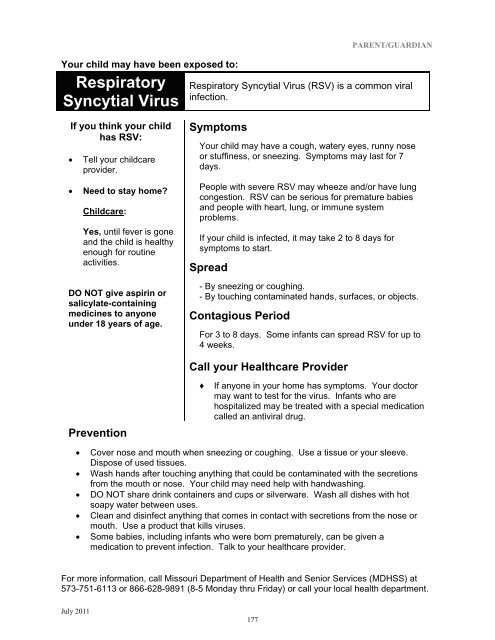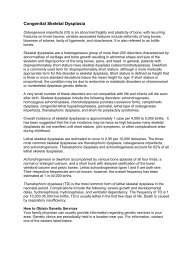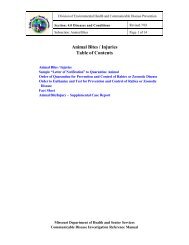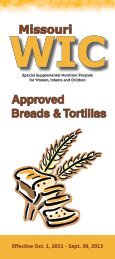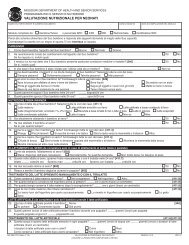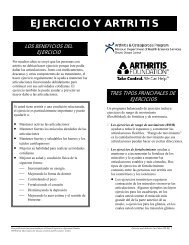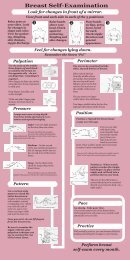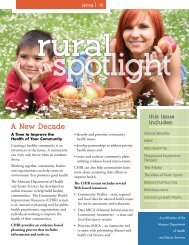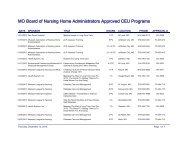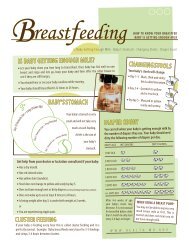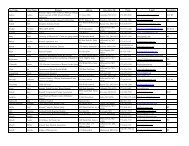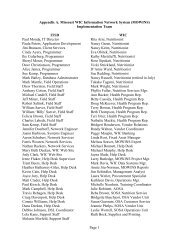Prevention and Control of Communicable Diseases - Missouri ...
Prevention and Control of Communicable Diseases - Missouri ...
Prevention and Control of Communicable Diseases - Missouri ...
Create successful ePaper yourself
Turn your PDF publications into a flip-book with our unique Google optimized e-Paper software.
Your child may have been exposed to:<br />
Respiratory<br />
Syncytial Virus<br />
If you think your child<br />
has RSV:<br />
� Tell your childcare<br />
provider.<br />
� Need to stay home?<br />
July 2011<br />
Childcare:<br />
Yes, until fever is gone<br />
<strong>and</strong> the child is healthy<br />
enough for routine<br />
activities.<br />
DO NOT give aspirin or<br />
salicylate-containing<br />
medicines to anyone<br />
under 18 years <strong>of</strong> age.<br />
<strong>Prevention</strong><br />
177<br />
PARENT/GUARDIAN<br />
Respiratory Syncytial Virus (RSV) is a common viral<br />
infection.<br />
Symptoms<br />
Your child may have a cough, watery eyes, runny nose<br />
or stuffiness, or sneezing. Symptoms may last for 7<br />
days.<br />
People with severe RSV may wheeze <strong>and</strong>/or have lung<br />
congestion. RSV can be serious for premature babies<br />
<strong>and</strong> people with heart, lung, or immune system<br />
problems.<br />
If your child is infected, it may take 2 to 8 days for<br />
symptoms to start.<br />
Spread<br />
- By sneezing or coughing.<br />
- By touching contaminated h<strong>and</strong>s, surfaces, or objects.<br />
Contagious Period<br />
For 3 to 8 days. Some infants can spread RSV for up to<br />
4 weeks.<br />
Call your Healthcare Provider<br />
♦ If anyone in your home has symptoms. Your doctor<br />
may want to test for the virus. Infants who are<br />
hospitalized may be treated with a special medication<br />
called an antiviral drug.<br />
� Cover nose <strong>and</strong> mouth when sneezing or coughing. Use a tissue or your sleeve.<br />
Dispose <strong>of</strong> used tissues.<br />
� Wash h<strong>and</strong>s after touching anything that could be contaminated with the secretions<br />
from the mouth or nose. Your child may need help with h<strong>and</strong>washing.<br />
� DO NOT share drink containers <strong>and</strong> cups or silverware. Wash all dishes with hot<br />
soapy water between uses.<br />
� Clean <strong>and</strong> disinfect anything that comes in contact with secretions from the nose or<br />
mouth. Use a product that kills viruses.<br />
� Some babies, including infants who were born prematurely, can be given a<br />
medication to prevent infection. Talk to your healthcare provider.<br />
For more information, call <strong>Missouri</strong> Department <strong>of</strong> Health <strong>and</strong> Senior Services (MDHSS) at<br />
573-751-6113 or 866-628-9891 (8-5 Monday thru Friday) or call your local health department.


